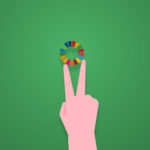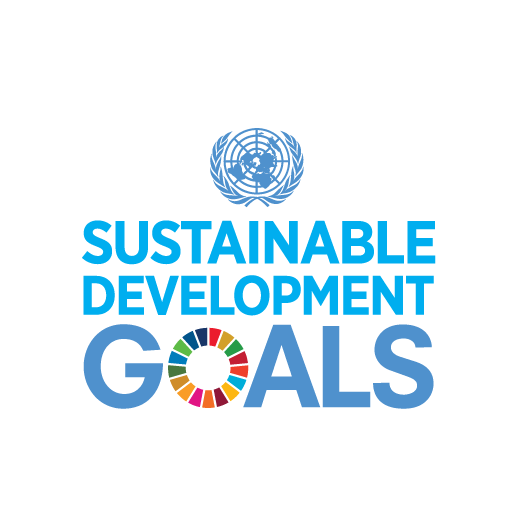Fifth anniversary of the SGDs: In the wake of COVID-19, sustainable development matters more than ever
On September 25, 2015, at the United Nations headquarters in New York, representatives from 193 countries approved the Agenda 2030. Pivotal to the agenda, the UN defined 17 Sustainable Development Goals and 169 targets – which were announced during the signing ceremony – that address a broad range of issues, from extreme poverty to climate change, and promote both education quality and gender equality, peace or responsible consumption. To commemorate the occasion, BBVA lit up in blue (in homage to the United Nations) its flagship La Vela building in its corporate headquarters in Madrid.

As a sign of recent commitment, Carlos Torres Vila, president of BBVA, signed, together with more than 1,000 Chairpersons or CEOs of some of the world’s leading corporations, a statement calling for renewed global cooperation. This statement singles out "peace, justice and strong institutions" as essential "to uphold the ten principles of the United Nations Global Compact and fulfill the SDGs."

The 75th anniversary of the UN is also a stark reminder that international cooperation must be mobilized across borders, sectors and generations to adapt to changing circumstances. The statement focuses on the opportunity for the private sector. “Now is our opportunity to learn from our collective experiences to realign behind the mission of the UN and steer our world onto a more equitable, inclusive and sustainable path. We are in this together — and we are united in the business of a better world,” concludes the statement.
The impact of COVID-19 on the development of the SDGs
On September 25, 2015, then UN Secretary General Ban Ki-moon’s words underscored the significance of the historic achievement: “We have a robust agenda before us and now we must strive to make it a reality in the lives of people everywhere,” he said. Five years later, in a global context marked by the COVID pandemic, this global plan remains more relevant than ever, as it urges all players in society to take action and encourages States to mobilize the necessary resources to implement the SDGs. For example, as regards SDG 1, if before COVID-19, if the 2030 was a challenging deadline, today, as a result of the pandemic, global poverty levels are spiking for the first time in decades.
2020 has been singled out as a pivotal year for the development of the SDGs. “It must signal the beginning of a decade of ambitious action in order to meet the 2030 deadline,” according to the UN. The 2030 Agenda had already started solidifying as a shared roadmap, where collaboration among stands as the key to working towards a fairer, more sustainable and more economically prosperous society. But the exceptional situation brought about by COVID-19 has escalated into a full-blown crisis that will inevitably mark a turning point.
In In fact, the UN has warned that it depends on society as a whole to turn this juncture into either a point of no return or a tipping point to reach a world where nobody is left behind. The world cannot afford to push back the deadline for fulfilling the SDGs, now that the health crisis has morphed into a social and economic crisis that has aggravated inequality and vulnerability levels of so many people.

The health crisis has morphed into a social and economic crisis that has aggravated inequality and vulnerability levels of so many people.
The pandemic impact on the SDGs
As stressed by António Guterres, current Secretary General of the United Nations noted, the pandemic has brought an additional level of complexity to the achievement of each one of the 17 Sustainable Development Goals.
From an economic and poverty standpoint, according to the World Bank "the ongoing crisis will erase almost all the progress made in the last five years.” Furthermore, for the first time since 1998, poverty rates will go up. In its Sustainable Development Goals Report, the UN says that it is estimated that the pandemic will push "71 million people back into extreme poverty in 2020.” In addition, the Economic Commission for Latin America and the Caribbean (ECLAC) forecasts that the number of people living in poverty in the region will rise by 45.4 million this year due to the pandemic, and for 2021, according to forecasts, progress in reducing poverty will suffer a major setback.
Furthermore, for the first time since 1998, poverty rates will go up, according to the World Bank.
In Spain, 33% of households are in a highly vulnerable financial situation, which means that they don’t have enough money saved to cover three months’ worth of expenses in absence of their main source of income, according to a BBVA Research paper. And only 23% of households have enough savings to cover for three to nine months’ worth of expenses.
Regarding people's health and well-being, the pandemic is pushing many countries’ health services to the brink. The World Health Organization (WHO) already issued a warning that this pandemic is likely to also take a significant toll on people’s mental health, and on healthcare workers’ in particular due to the stressful conditions under which they are enduring. Furthermore, the United Nations’ entity for gender equality UN Women, has also warned about the impact on gender inequality. pointing out that “the pandemic will push about 47 million more women and girls under the poverty line, reversing decades of progress to eradicate extreme poverty.”
The challenges faced in achieving SDG number 4 - “Quality Education” – have also increased significantly due to the coronavirus. UNESCO recently warned that only half of students will return to classrooms at this stage and that the risk of dropouts, decreased quality of learning, and negative social and economic impacts is high. In Spain, some reports, as the one released by Fad and BBVA, in the framework of the Connected Education project, also cautions about the digital divide that affects younger students and that seven out of 10 teachers are concerned about the lack of devices to remotely follow classes.
Furthermore, in different parts of the world, the coronavirus healthcare crisis and its consequences are exacerbated by issues such as the lack of access to clean water and sanitation, job losses, widespread inequalities, and above all else, entrenched poverty and food insecurity.
Leveraging the crisis to accelerate change
Despite 2030 being only ten years away and the unfolding scenario, the UN has pointed out that there are still reasons for optimism: “The coronavirus pandemic offers us a chance to turn this crisis into an opportunity to accelerate change towards fulfilling the SDGs.” A way to share the message with the world that the SDGs envisage multiple economic and sustainable actionable levers that could provide a faster way out of the current economic crisis.
“The coronavirus pandemic offers us a chance to turn this crisis into an opportunity to accelerate change towards fulfilling the SDGs “
Therefore, the Sustainable Development Goals must continue to be regarded as a guiding framework by the international community, national governments, the business sector and civil society, in a world forced to coexist with the coronavirus, ever-changing and facing increasing uncertainty. Only the commitment to these principles can guarantee a sustainable development and the fulfillment of the underlying idea that inspired the SDGs: “we cannot leave anyone behind.”

